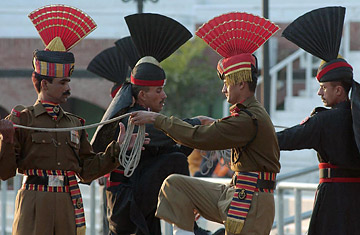
Pakistani (in black) and Indian (in brown) border guards perform the daily retreat ceremony on the India-Pakistan Border at Wagah on December 28, 2007, after the assassination of former Pakistani Prime Minister Benazir Bhutto.
Are India and Pakistan finally learning to get along? The two nations were born in a bloody partition at independence almost 61 years ago, and their relationship has never really recovered, having fought three wars and regular skirmishes along the cease-fire line that divides the disputed territory of Kashmir. The stakes were raised considerably at the end of the last decade, when both sides tested nuclear weapons. Still, in recent years, there has been growing reason for hope that Islamabad and New Delhi can not only learn to coexist, but might even be able to forge a trade and business-based friendship.
The most colorful recent sign of detente was Pakistan's decision to partly lift its ban on Indian films. Officially, Bollywood movies have been banned in Pakistan since the 1965 war between the two countries. But Indian stars and big-budget dance numbers have a huge following in Pakistan, and are now widely available via black-market DVDs. Indian films shot in third-party countries have been allowed in Pakistan for the past four years, and now a Pakistani Senate Committee says it will allow in 12 Indian films a year as long as Pakistani films are shown in India. The arrival of proper Bollywood films means Pakistanis can sing, dance and whistle along with the latest hit in jam-packed theaters. "It is this experience of Bollywood masala [spice-mix] that Pakistanis have missed for four decades," wrote the Singapore-based Asia Times newspaper. "The decision to lift the ban indicates how far the normalization of the India-Pakistan bilateral relationship has moved."
It's set to progress even further. Three weeks ago, the two countries announced an agreement to double the number of weekly cross-border passenger flights. There are currently 12 flights a week on the state-owned national carriers connecting Delhi and Lahore and Mumbai and Karachi. The new deal will allow up to three airlines from each country to fly between a wider range of cities including, possibly, between the two capitals. The agreement, a joint statement said, will improve "people to people contact, business and trade activities." Business people on both sides of the border have long argued that trade and investment could ease tensions between the two states.
The key flashpoint in six decades of conflict has been Kashmir, which is claimed by both India and Pakistan. For years Pakistan had actively supported a guerrilla insurgency against the Indian authorities, but Islamabad seems to have bent to U.S. pressure and called off the biggest Pakistan-sponsored Kashmir jihadist groups. Pakistani officials long suspected of meddling in Kashmir have lately been kept busy with problems closer to home, such as the insurgencies along the the border with Afghanistan and elsewhere in Pakistan.
India's political leaders, meanwhile, appear to have grasped the reality that political stability and development in Kashmir could be of benefit to all. Violence there has been reduced to the point where the Kashmir insurgency is no longer even the biggest internal security issue facing India. Last year, the number of people killed by a Maoist insurgency in eastern and central India was higher than those killed in the Kashmir Valley. "The entire thinking is changing," says Balraj Puri, the director of the Institute of Jammu and Kashmir Affairs and author of a recent book entitled Kashmir: Insurgency and After. "There's a growing realization in both countries that we should be friends."
While there's always the chance that a new dispute could flare up, Pakistan's government-in-waiting is expected, when it is seated, to take a conciliatory and politically smart approach to its neighbor. Asif Ali Zardari, who took over the reins of the Pakistan People's Party after the assassination of his wife Benazir Bhutto in December, says that India and Pakistan should not be held "hostage" to the dispute over Kashmir, and that the two countries "can wait" to resolve their impasse at a later time. "That is a situation we can agree to disagree [on]," he told a TV reporter last week. "Countries do, we have positions, you have positions... We can wait. We can be patient till everybody grows up further." That won't please hawks and extremists in either country — but it's music to the ears of political realists, entrepreneurs — and ordinary Pakistanis and Indians alike.
